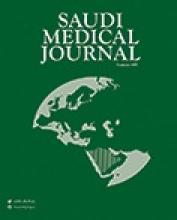Abstract
OBJECTIVE: To assess the association between electrocardiogram (ECG) changes in non-ST-segment elevation acute coronary syndrome (NSTE- ACS) patients with severity of coronary artery disease (CAD) and short-term outcome.
METHODS: In this cross-sectional descriptive-analytical study, 111 patients admitted to the Cardiology Department of Shahid Madani Heart Hospital, Tabriz, Iran between March 2005 and March 2007 with first NSTE-ACS, and had undergone coronary angiography during index event were evaluated.
RESULTS: One hundred and eleven patients (64 males, and 47 females) were enrolled, and their in-hospital and short-term outcome with a mean follow-up period of 4.6 +/- 1.8 months was evaluated. Patients with ST-T changes on admission had higher rates of death (16.7 versus 2.7%, p=0.01), recurrent angina (36.1 versus 6.7%, p=0.001), and pulmonary edema (8.3 versus 1.3%, p=0.045). The mean left ventricular ejection fraction (LVEF) of patients with ECG changes were significantly lower than those without ECG changes (p=0.001). Mitral regurgitation (MR) was also more common among those with ECG changes (p=0.006). In a multivariate regression analysis, the only independent predictor of short-term mortality and adverse clinical event was ST depression on ECG (p=0.001).
CONCLUSION: In patients with first NSTE-ACS, ST deviation is associated with adverse short-term outcome including more severe CAD, lower LVEF, and more common MR.
- Copyright: © Saudi Medical Journal
This is an open-access article distributed under the terms of the Creative Commons Attribution-Noncommercial License (CC BY-NC), which permits unrestricted use, distribution, and reproduction in any medium, provided the original work is properly cited.






